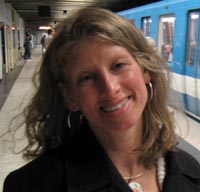 On September 22, Philadelphia will celebrate its first One Web Day. Maybe celebrate isn’t the right word for it—this year’s event is about digital inclusion, or the lack thereof.
On September 22, Philadelphia will celebrate its first One Web Day. Maybe celebrate isn’t the right word for it—this year’s event is about digital inclusion, or the lack thereof.
Modeled after Earth Day, One Web is an international event meant to raise the public’s awareness of Web issues. No, not the Facebook redesign. We’re talking issues like estimates that 50 percent Philadelphia does not have access to the Internet.
This year, organizer Gwen Shaffer is helping bring the event to Philly for the first time. “It’s an opportunity to demonstrate the positive impact broadband can have on people’s lives,” Shaffer says. She hopes to have a week of service built around the main event, a day filled with speakers, multimedia and stories about the Net’s impact.
“We will probably collect testimonials from either people who don’t have Internet and talk about how it would change their lives, and then get stories from people about how their lives were different before they had broadband,” she says. “Put a human face on what many of us take for granted.”
The organizers need your help. Shaffer says she is confident that the City will participate with the event, but the search for volunteers, corporate sponsors and additional partners has only begun. After the jump, it’s hard not to be persuaded into lending a hand.
 What’s your personal stake in One Web Day?
What’s your personal stake in One Web Day?
It’s an issue I care about. I’m about to finish my PhD and I studied telecommunications policy. The majority of research I’ve done is on digital inclusion and online civic engagement.
Were you studying Philadelphia’s digital inclusion or looking at broader issues?
A few years ago when Wireless Philadelphia existed I did a study on it and on municipal wireless networks in general, I have done multiple studies on alternative broadband models and my dissertation is on peer-to-peer networking; wireless network sharing. The idea is to get more people online, especially in low income neighborhoods, where somebody can’t afford $45 a month, why not share the bandwidth?
Because Comcast says you can’t, right?
Right, exactly. One of the things I proposed in my dissertation, there’s E-Rate, where schools and libraries are subsidized for up to 90 percent of their Internet connections. So, for instance, the Free Library only pays a small amount for the monthly subscription and the Federal government reimburses the rest. If those centrally located places can open up their signal, then all those neighbors can get free Internet access. It’s all about policy. Deciding that we want to prioritize this.
Do you have any potential partners for One Web Day?
Our plan is to partner with the Philadelphia Housing Authority and I met with them last week and I have a tentative commitment. If we can get corporate sponsors, we’re going to try to get some companies to donate computers that they no longer use to PHA. In San Francisco, one of the things Digital Inclusion program did was get some local legislation passed where there’s a tax break or some kind of incentive for companies to give away computers to be refurbished rather than recycle them [See our coverage of the school district’s e-waste problem]. Maybe they’d even have employees who’d want to volunteer.
What kind of things to do you expect to happen during the week of service?
One of the things I’ve talked about doing is having volunteers come in and do basic computer training with PHA residents. Then, doing some really targeted stuff like possibly going to some of the high rises that are designated for senior citizens, for example, and teaching people just how to use e-mail. And maybe another workshop that’s targeted for job seekers in public housing. With high school kids, we could do a college resource workshop.
This would certainly raise awareness but where would you like to see it go after the week of service?
Hopefully it will be a catalyst for some policy changes that will help mobilize people that are interested in this issue to keep putting pressure on lawmakers to expand Internet access for residents. Depending on where the city is on Digital Philadelphia come September 22, maybe this could be a good platform to talk about Allan Frank’s plans.
How can folks get in contact with you?
There’s a Philly Web page setup at One Web Day. Anyone can e-mail me directly, too. I’m hoping to have our first organizing meeting soon.
Anything else you want to say to convince folks to volunteer?
I interviewed librarians at branches around the city and it was routine to talk to people who said that patrons wait 2 hours to use a computer at the Philadelphia Free Library branches for 30 minutes. The demand is there and we need to address it. Computers in public spaces are great but they’re not the solution. People need connectivity at home. That’s where the conversation needs to shift.
Every Friday, Technically Philly brings an interview with a leader or innovator in Philadelphia’s technology community. See others here.
Before you go...
Please consider supporting Technical.ly to keep our independent journalism strong. Unlike most business-focused media outlets, we don’t have a paywall. Instead, we count on your personal and organizational support.
Join our growing Slack community
Join 5,000 tech professionals and entrepreneurs in our community Slack today!

The person charged in the UnitedHealthcare CEO shooting had a ton of tech connections

From rejection to innovation: How I built a tool to beat AI hiring algorithms at their own game

The looming TikTok ban doesn’t strike financial fear into the hearts of creators — it’s community they’re worried about
